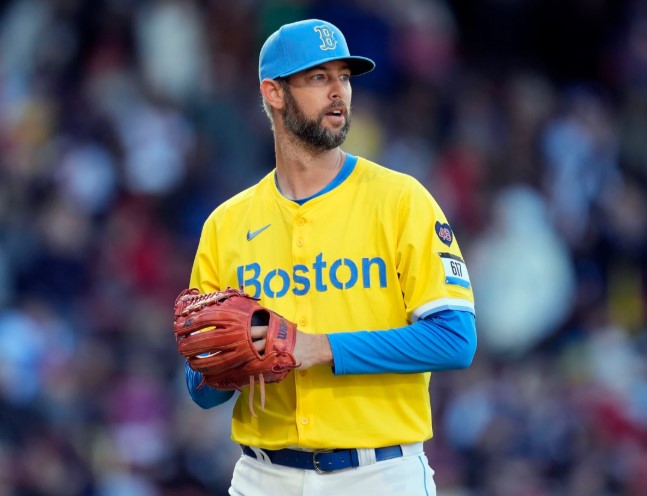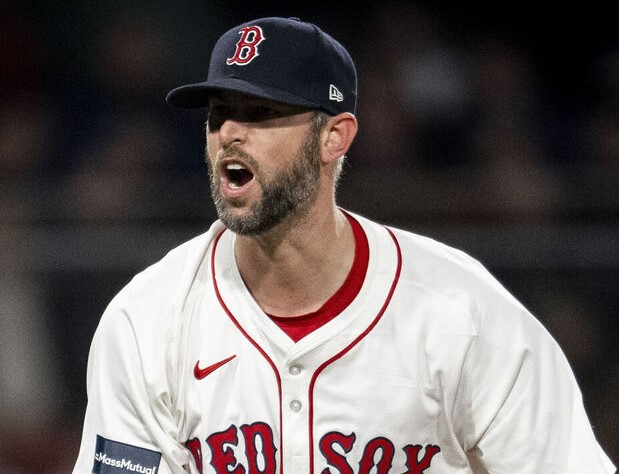HEARTBREAKING YET HOPEFUL: Chris Martin Discovered a Genetic Heart Condition, Nearly Retired – But His 8-Year-Old Son’s Tearful Words Made Him Stay in Baseball
Chris Martin thought the hardest part of baseball was the grind: the endless travel, the uncertainty, the days you wake up in a hotel not quite sure which city you’re in. He never imagined the hardest moment would come in a quiet doctor’s office in March, when a cardiologist looked at him and said words that made the world blur: “You’re at risk of an aortic aneurysm.”
The diagnosis came after a routine screening flagged a genetic marker in Martin’s family. The tests confirmed an enlargement in his aorta that, if left unchecked, could turn catastrophic with one wrong pitch or one wrong moment. It was the sort of thing that made Martin think about more than baseball.
“I was sitting there, and all I could think about was my kid,” Martin said. “I thought, ‘He needs a dad more than baseball needs another reliever.’”
Martin went home and told his wife. Then he sat down with his 8-year-old son, Jace, who always wears his dad’s jersey on days he’s pitching. He told him there was a chance he might need to stop playing. To his surprise, Jace’s eyes filled with tears.
“Dad, I want you to keep pitching,” Jace said quietly. “It’s my favorite thing.”
That sentence was enough to crack Martin open.

In a world where athletes often measure worth by velocity and stats, Martin was now measuring each day by blood pressure and a cardiologist’s cautious optimism. He flew to specialists, consulted team doctors, and even visited players who had experienced similar scares.
The Red Sox gave Martin space. They told him the decision would be his alone. They would support him if he needed to retire immediately. But they would also stand with him if he chose to continue, under tight monitoring, careful training loads, and emergency planning in place.
“It was a strange place to be,” Martin said. “I was grateful, but I was scared. Every time I went to the bullpen, I wondered: Is this the day something happens?”
But baseball, like life, often moves forward in small, hopeful steps. Martin began to pitch again, first in controlled bullpen sessions, then in lower-stress outings. He felt strong. His velocity was there. More importantly, his doctors were seeing stability in his condition. They cleared him to pitch, with conditions: strict checkups, constant monitoring, and immediate reporting of any symptoms.
In April, Martin made his season debut in front of a Fenway Park crowd that had no idea the battle he was fighting beyond the mound. He fired a clean inning, striking out two, walking off the field to polite applause. His son was watching from home, jumping up and down.
For Martin, it was more than just another game. It was a quiet triumph against fear.
Off the field, Martin has begun quietly speaking with other athletes who face health scares. He knows what it’s like to have your world tilt in a doctor’s office, to feel like the future you planned is vanishing, and to wrestle with the responsibility of being a father, husband, and son while also being an athlete. He’s partnered with a Boston-based heart health nonprofit to raise awareness for genetic screenings among athletes, and he’s funding screenings for youth baseball players in low-income communities this summer.
“I want to use whatever time I have left in this game to help people understand that your health is bigger than baseball,” Martin said. “And I want to show my son that being strong means taking care of yourself.”

His story has quietly circulated in the clubhouse, where teammates have found inspiration in Martin’s resilience and vulnerability. They’ve seen him check his blood pressure before games, talk to trainers about his condition, and walk out to the mound anyway, focused and calm.
“He’s got guts,” one teammate said. “The dude’s still out here competing, and he’s got a reason bigger than the game.”
For Martin, the season is still long. There will be more checkups, more doctor calls, and maybe, down the road, the hard decision to step away. But for now, he’s here, pitching, smiling, hugging his son after games, living the life he nearly walked away from.
In a sport obsessed with numbers, Martin’s ERA, WHIP, and strikeout rates will still matter. But the number that matters most to him is the number of days he gets to walk into the clubhouse, pull on a jersey, and hear his son’s excited voice when he gets home: “Dad, you pitched today.”
It’s easy to forget that athletes are human. That beneath the lights and the cameras, there are dads, husbands, and sons carrying quiet fears and quiet hopes. Chris Martin is reminding baseball—and himself—that some victories are bigger than the ones that show up in a box score.
And in Fenway Park, on a warm summer day, when Martin takes the mound and fires a fastball that pops into the catcher’s glove, it’s not just another pitch. It’s a promise to an 8-year-old boy that his dad is still here, still fighting, and still living the dream they share together.